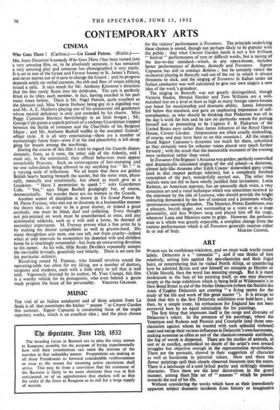MUSIC
THE visit of an Italian conductor and of three soloists from La Scala is all that constitutes the Italian " season "at Covent Garden this summer. Signor Capuana is conducting three of the staple repertory works, which is an excellent idea ; and the piece chosen for the visitors' performance is Trovatore. The principle underlying these choices is sound, though not perhaps likely to be popular with the public : that what Covent Garden needs is not a few brilliant " festival" performances of rare or difficult works, but a raising of the day-to-day standard—which, in any opera-house, includes better performances of Boheme, Butterfly and Trovatore. Signor Capuana has still to conduct Boheme ; but he certainly raised the orchestral playing in Butterfly well out of the rut in which it always threatens to stick, and the singing of Trovatore in Italian under an Italian conductor was well calculated to give our own singers a new idea of the work's grandeur.
The singing in Butterfly was not greatly distinguished, though Victoria Sladen, Monica Sinclair and Tom Williams are a well- matched trio on a level at least as high as many foreign opera-houses can boast for musicianship and dramatic ability. James Johnston fell below this standard, and gave an unpleasing impression of self- complacency, as who should be thinking that Pinkerton was all in the day's work for him and he saw no particular reason for putting himself out or pretending to be Captain F. B. Pinkerton of the United States navy rather than James Johnston of the Royal Opera House, Covent Garden. (Impressions are often cruelly misleading, of course, and may have been so on this occasion.) All the singers found Signor Capuana's dynamics too much for them, calculated as they certainly were for robuster voices placed very much further forward ; with the result that the memorable moments of the evening were orchestral rather than vocal.
In Trovatore Ebe Stignani 's Azucena was golden, perfectly controlled and dramatically calculated singing of the old school—a decorous, almost lady-like Azucena after Edith Coates' dishevelled gipsy crone (and in that respect perhaps inferior), but a completely finished conception of the part, wonderfully carried out. The other two visitors were not felt to have wholly justified their invitations. Lucia Kelston, an American soprano, has an unusually dark voice, a very conscious art and a vocal technique which was sometimes strained to the uttermost by the role of Leonora, who should provide the bright colouring demanded by the law of contrast and a passionate wholly spontaneous-seeming abandon. The Manrico, Primo Zambruno, was a pleasant, boyish singer, not outstanding as a voice or as a stage personality, and Jess Walters sang and played him off the stage, whenever Luna and Manrico came to grips. However, the perform- ance as 'a whole was greatly enjoyable, a complete change from the routine performances which is all Trovatore generally receives either


































 Previous page
Previous page